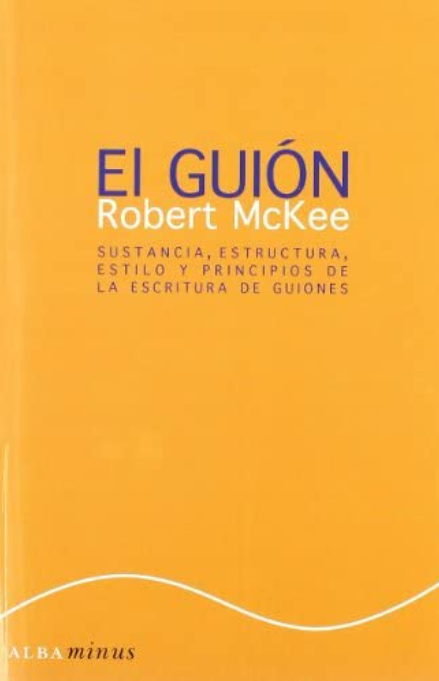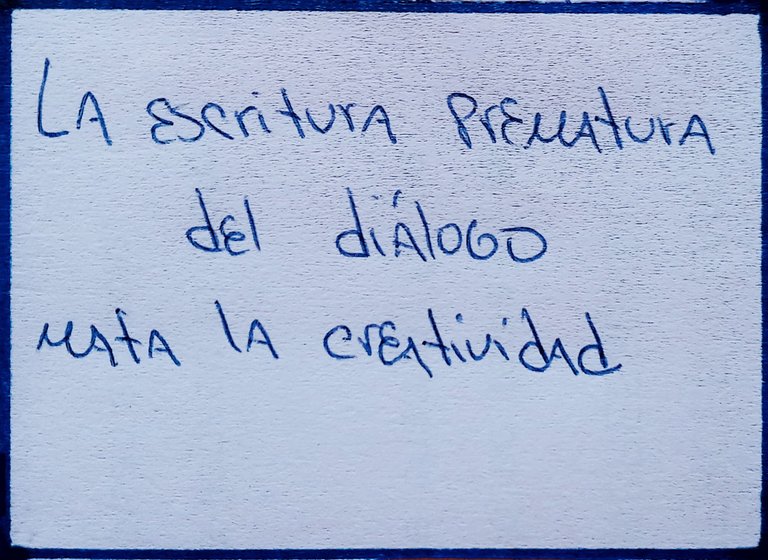[ES-EN] Este sistema me ayudará a terminar mi novela (y seguro a ti también) | Dito Ferrer

No importa el género, ni la temática, ni las complejidades de la trama. De todas formas vamos a concentrar todas nuestras energías y esperanzas en el momento en que podamos escribir "punto y final." Ese es el destino en la ruta y el momento de liberación.
Pero conseguir esto es difícil, sobre todo para nosotros, los noveles. Hay un camino muy largo entre desear con todo el corazón ver nuestra novela terminada y que realmente lo esté. Necesitamos ayuda para conseguir esto, es muy díficil hacerlo solos.
Ahí entran a escena los manuales de escritura; consejos para sacar al escritor que todos llevamos dentro, frases de célebres autores. No sé si te ha pasado, pero consumir este tipo de contenido se siente bastante como ver Neftlix. Los mejores consejos suenan así:
. Escribe todos los días
. Disfruta de tu escritura
. Perseverancia ante todo
. No pienses, deja correr la pluma libre
. Convierte los fracasos en tu fortaleza

Estoy seguro que, tanto como yo, has leído innumerables páginas de consejos y artículos del tipo "palmaditas en el hombro" para ayudarte a escribir tu novela.
Te motivaste y, a escribir!
40 o 50 páginas más tarde... Pufff! Bloqueo.
¿Te ha sucedido esto? ¿Te está sucediendo ahora?
"La motivación no ayuda a terminar novelas. Un buen sistema sí.
La falta de un buen sistema es lo que, a mi entender, nos frustra como escritores. Intentamos llenar ese vacío con más motivación y el ciclo comienza de nuevo. Entonces nos empeñamos en buscar las causas afuera, o encontrar un culpable que pague por nuestras faltas. Esto no son más que justificaciones. Precisamente algunas que he leído suenan así:
. No tengo tiempo
. La casa, los niños
. Estoy bloqueado
. Tengo demasiadas ideas
. Necesito más documentación
. No puedo con esto, es muy duro
. Un manual de escritura más y ya empiezo
Lee este último antes de empezar. Te gustará. Lo prometo.
¿Recuerdas que existen dos tipos de escritores?
Los jardineros (o escritores de brújula), no realizan un plan previo. Los golpea la inspiración y se lanzan sin más a escribir. Por el camino van descubriendo la historia y se permiten sorprenderse con los giros de la trama y el desarrollo de personajes.
Los arquitectos (o escritores de mapa), establecen una hoja de ruta. Trazan en un papel el camino a seguir, los principales puntos. Saben adónde quieren llegar, el final de la historia, y planifican la travesía para que la trama y los personajes lo conduzcan allí de una manera coherente.
El punto que tienen en común estas categorías es que ambas utilizan un sistema. Uno funciona de modo inconsciente y el otro no, pero siguen siendo un conjunto de normas que repiten una y otra vez para guiarlos en su travesía.
Me identifico más con el arquitecto, así que me di a la tarea de buscar un sistema que me ayudara a encontrar mi camino. Uno lo suficientemente sólido para confiar cualquier historia a su metodología, pero que fuera también flexible y me permitiera improvisar y cambiar. Busqué y busqué...
Y encontré esta joya.

El Guión explica todo aquello que hace que un guión resalte por encima de los demás: las características del género, la estructura de las escenas, la ambientación, las caracterización de los personajes, cómo lograr el clímax.
Está escrito por Robert McKee, quien es una especie de gurú de la industria cinematográfica y ha formado a muchísimos guionistas reconocidos y premiados por la Academia.
El libro es una herramienta para escribir guiones de cine, pero sus fundamentos, aplicados a nuestras novelas, nos salvarán la vida. Aquí encontré el sistema que estoy usando para escribir mi novela:
Escribir de adentro hacia afuera
El libro explica que muchos guionistas inexpertos imaginan una escena, o una línea de diálogo que los motiva y en seguida se lanzan a escribir la película, guiados por esa sensación. Solo para descubrir al final que, si consiguieron terminar, fracasaron en la coherencia general del filme, o que escenas brillantes están rodeadas de otras mediocres. O que sencillamente no tienen ninguna historia en absoluto.
Esto lo podemos traer al mundo de la literatura. ¿Cuántas veces no empezamos con una idea que se nos hace interesante, o un personaje, o una situación y nos lanzamos en maratón en busca de la historia que sabemos que está ahí? ¿Cuántas veces se nos ha escapado?
Este libro propone un sistema para solucionar esto:
1- El resumen de la historia en pasos
Esto no es más que el resumen de la historia narrada paso a paso.
Empezamos imaginando lo que sucede en nuestra novela. Escena a escena, como si estuviéramos viéndola en una pantalla de cine. ¿Qué ocurre en cada escena? ¿Cómo se construye? ¿Cómo cambia? ¿Cómo hace avanzar la historia?
Imagínate escribiendo ideas en una libreta: al protagonista le sucede esto, luego pasa esto, a continuación conoce a este otro personaje, y luego descubre esto...
La clave de este primer paso es destruir tu trabajo. Has oído bien: DESTRUIR. El libro establece que el 90% de los que se nos ocurrirá será mediocre. Así que se necesita crear mucho material para después filtrar y quedarse con lo mejor.
Muchos de nosotros empezamos a escribir y se nos ocurren ideas que consideramos geniales. Más tarde las revisamos y nos parecen una mierda, si resulta que ya invertimos tiempo describiendo la escena, construyendo un diálogo y mostrando una acción, nos sentiremos frustrados y nos resistiremos a eliminarla. Entonces pensamos que a lo mejor no está tan mala, que podemos modificarla porque, "esa descripción me quedó genial" o "esa línea de diálogo es muy poderosa."
La solución a esto es solo escribir los enunciados de las acciones que suceden en tu novela. Aceptar que está bien inventar y fallar, quitar, reconsiderar y volver a comenzar. Imagina que todas estas ideas mediocres son el sedimento, la verdadera joya se encuentra enterrada un poco más abajo.
Este proceso no te aleja de llenar páginas, también te encontrarás escribiendo bastante prosa. Vas a ir apilando mucho material: biografías, elementos de worlbuilding, notas temáticas, nombres y el resultado de tus investigaciones. Sí, porque a medida que tu resumen en pasos avance, la misma historia te irá indicando qué necesitas.
Muchas veces los escritores nos lanzamos a crear un mundo para luego contar una historia, o imaginamos el pasado de un personaje antes de saber cuál es su papel en la trama. Esto nos conduce a descartar mucho material. A partir del resumen en pasos, la historia decide qué añadir y qué no.
Escribe hasta que encuentres tu clímax narrativo
Vas a seguir con este proceso hasta que encuentres el punto donde todo hace click. El momento justo antes del desenlace, donde se acumula la mayor cantidad de tensión y conflictos. ¿Y ahora qué? Ahora toca regresar atrás, volver a revisar cada paso de tu resumen para fortalecer la historia. Esto te va a ayudar a:
. Mejorar el foreshadowing (previsiones, prefiguraciones), establecer las semillas de las situaciones para que cuando estas sucedan sean interpretadas como naturales, en el contexto de tu historia.
. Vas a identificar las escenas claves, aquellas que marcan los puntos de giro fundamentales, el incidente incitador y las escenas de mayor simbolismo.
De nuevo, imagina hacer esto a un borrador terminado. Aquí solo estás trabajando con casillas en una libreta o tarjetas de cartón en una pared, puedes borrar, romper y volver a escribir.
Llegado a este punto puedes empezar a escribir algunas escenas para tantear el tono, el estilo y la persona desde la cual vas a escribir.
2- La BiBlia
Así es como llama McKee a esta parte. Vas a convertir cada unos de los pasos que escribiste en tu resumen, en uno o más párrafos de descripción en momento presente, que narre la escena momento a momento.
Indica de qué van a hablar los personajes pero no escribas diálogo. Crea el subtexto, las intenciones y lo que realmente quiere decir el personaje. Esto va a hacer mejorar enormemente la calidad de cada escena porque no siempre se necesita diálogo, a veces el mensaje se transmite mejor haciendo que el personaje calle, o ejecute una acción. De esta manera nos vamos a dar cuenta mucho mejor cuál sería la reacción adecuada en cada caso.
Además nuestros personajes no cometerán el error de "informar al lector," que sucede cuando el autor quiere que el público sepa algo importante, así que hace que el personaje lo diga. También la calidad del diálogo en sí mejorará mucho porque se va a decir lo justo para enriquecer la historia. El diálogo no es una conversación cualquiera, tiene un objetivo. Luego de tener a nuestros personajes callados durante tanto tiempo y entender sus intenciones y todo el subtexto, seguro nos sorprenderán con su ingenio y dirán frases potentes.
Tengo esta cita del libro colgada en el mural de mi pared:

Imagen hecha con mi celular
La redacción prematura del diálogo mata la creatividad.
Por supuesto, y como cada fase en un proceso creativo, la escritura de la Biblia nos va a llevar a modificar elementos del resumen en pasos y estos a su vez incidirán en otros. La investigación y la imaginacion nunca se detienen, todo seguirá evolucionando y alcanzado niveles mejor elaborados. Es así como debe ser, hay que trabajar duro en esta fase, pero vale la pena. Tienes la estructura de tu historia, puedes hacerla crecer o encogerse, pero es un animal domesticado, hará lo que le digas.
Terminando de escribir la Biblia tendrás ya varios miles de palabras escritas, casi una noveleta o un cuento largo, pero cada momento de la historia debería verse tan vívido como si estuvieras allí. Tanto el texto (lo que van a decir los personajes, pero sin diálogo), como el subtexto (lo que realmente quieren decir) estarán bien claros en tu cabeza, así como todo el simbolismo, las tramas secundarias y el ritmo.
¡Atento! Evita cometer errores.
Desesperarse e intentar saltar directamente a la Biblia, o sobreanalizar cada escena, buscando un desempeño perfecto, conducirá al bloqueo. Cada fase tiene su momento y tu historia te lo dirá.
3- Ahora sí. ¡Lánzate a Escribir!
En esta fase escribir deberá sentirse como un placer, sin obstáculos ni presiones. Seguro podrás podrás establecerte metas altas de escritura diaria y la motivación de saber que estás avanzando te creará momentum y más motivación.
Llegar de esta forma a la fase del primer borrador te va a permitir concentrarte en el mostrar y no contar, utilizar una acción relevante y una descripción necesaria. Probablemente continúes haciendo cambios mientras escribes pero ya tienes tu esqueleto argumental, ve a la Biblia y modifica. Incluso creo que bastará con leerla para ajustar curso. Así de bien conocerás la historia llegado este momento.
Todo este proceso es bastante trabajo, soy el primero en reconocerlo. Pero creo que toda obra que nos ocupe meses de nuestras vidas merece ser planificada desde el acercamiento más profesional posible. Un sistema que nos permita terminar nuestra novela. Uno de los autores más prolíficos de la actualidad, Brandon Sanderson , explica en esta extensa entrevista , su sistema de trabajo, bien parecido a este que analizamos hoy.
Esto no significa que los escritores que no planifican se libran de tener que trabajar bien duro. Ellos también tienen lo suyo. No pienso que un enfoque sea mejor que otro. Solo tiene que ver con escoger cuando quieres pasar el mayor trabajo: al principio o al final. Cada quien es libre de escoger y adaptar esquemas existentes según su propia personalidad.
Espero que te haya resultado útil este artículo. Este es el proceso que estoy siguiendo para la creación de mi primera novela, La Comunidad de los Exiliados. Si quiere saber de qué va y lo que pienso hacer con ella una vez terminada, pincha aquí
Comenta si te sentiste identificado con este sistema. Si conoces otros que te hayan funcionado en el pasado o si te consideras "jardinero" y todo esto te resbala jajaja 😄
Este post formará parte de una colección donde estaré agrupando todo lo relacionado con la creación de mi novela y su mundo.
Gracias por tu tiempo.
ENGLISH
No matter the genre, no matter the subject matter, no matter the complexities of the plot. However, we are going to focus all our energies and hopes on the moment when we can write "period." That is the destination on the road and the moment of release.
But achieving this is difficult, especially for us novices. There is a very long way between wishing with all our hearts to see our novel finished and being finished. We need help to achieve this, it is very difficult to do it alone.
That's where writing manuals come in; tips to bring out the writer in all of us, phrases from famous authors. I don't know if it's ever happened to you, but consuming this kind of content feels a lot like watching Netflix. The best advice sounds like this:
. Write every day
. Enjoy your writing.
. Perseverance above all
. Don't think, let the pen run free and turn failures into your strength

I'm sure that, like me, you've read countless pages of advice and "pat on the shoulder" articles to help you write your novel.
You got motivated and, off you go to write!
40 or 50 pages later... Pfft, I'm stuck.
Has this happened to you, is it happening to you now?
Motivation doesn't help you finish novels. A good system does.
The lack of a good system is what, in my opinion, frustrates us as writers. We try to fill that void with more motivation and the cycle starts all over again. Then we insist on looking for the causes outside or finding a culprit to pay for our faults. These are nothing more than justifications. Precisely some that I have read sound like this:
. I don't have time.
. The house, the children
. I am blocked.
. I have too many ideas.
. I need more documentation
. I can't do this, it's too hard.
. One more writing manual and I'll start
Read this last one before you start. You'll like it. I promise.
Remember there are two types of writers.
Gardeners (or compass writers), don't make a prior plan. They are struck by inspiration and just start writing. Along the way, they discover the story and allow themselves to be surprised by plot twists and character development.
Architects (or map writers) establish a road map. They plot on paper the path to follow, the main points. They know where they want to get to, the end of the story, and they plan the journey so that the plot and characters lead you there in a coherent way.
The point these categories have in common is that they both use a system. One works unconsciously and the other does not, but they are still a set of rules that they repeat over and over again to guide them on their journey.
I identify more with the architect, so I set out to find a system to help me find my way. One solid enough to trust any story to its methodology, but also flexible enough to allow me to improvise and change. I searched and searched...
And I found this gem.

The Screenplay explains everything that makes a screenplay stand out from the rest: the characteristics of the genre, the structure of the scenes, the setting, the characterization of the characters, and how to achieve the climax.
It is written by Robert McKee, who is something of a film industry guru and has trained many, many Academy Award-winning screenwriters.
A book is a tool for writing movie scripts, but its fundamentals, applied to our novels, will save our lives. Here I found the system I am using to write my novel:
Writing from the Inside Out.
The book explains that many inexperienced screenwriters imagine a scene, or a line of dialogue that motivates them and immediately launch into writing the movie, guided by that feeling. Only to discover at the end that, if they managed to finish, they failed in the overall coherence of the film, or that brilliant scenes are surrounded by mediocre ones. Or that they simply have no story at all.
We can bring this to the world of literature. How many times do we start with an idea that strikes us as interesting, or a character, or a situation, and then go on a marathon in search of the story we know is there? How many times has it escaped us?
This book proposes a system to solve this:
1- The story summary in steps.
This is nothing more than the summary of the story narrated step by step.
We start by imagining what happens in our novel. Scene by scene, as if we were watching it on a movie screen. What happens in each scene? How does it build? How does it change? How does it move the story forward?
Imagine writing down ideas in a notebook: the protagonist has this happen, then this happens, then he meets this other character, then he discovers this...
The key to this first step is to destroy your work. You heard that right: DESTROY. The book states that 90% of what we will come up with will be mediocre. So you need to create a lot of material and then filter and keep the best.
Many of us start writing and come up with ideas that we think are great. Later we review them and they seem like crap, if it turns out that we've already spent time describing the scene, building a dialogue, and showing an action, we'll get frustrated and resist eliminating it. Then we think that maybe it's not so bad, that we can modify it because "that description looked great to me" or "that line of dialogue is so powerful."
The solution to this is to just write the statements of the actions that happen in your novel. Accept that it's okay to make it up and fail, take it down, reconsider and start over. Imagine that all these mediocre ideas are the sediment, the real jewel is buried a little further down.
This process doesn't take you away from filling pages, you'll also find yourself writing quite a bit of prose. You'll be piling up a lot of material: biographies, worldbuilding elements, theme notes, names, and the results of your research. Yes, because as your step-by-step summary progresses, the story itself will tell you what you need.
Many times we writers jump into creating a world to tell a story, or we imagine a character's past before we know what his or her role in the plot is. This leads us to discard a lot of material. From the summary in steps, the story decides what to add and what not to add.
Write until you find your narrative climax.
You're going to keep going through this process until you find the point where everything clicks. The moment just before the denouement, where the most tension and conflict builds up. Now what? Now it's time to go back and revisit each step of your summary to strengthen the story. This will help you:
. Improve foreshadowing, and establish the seeds of situations so that when they happen they will be interpreted as natural, in the context of your story.
. You are going to identify the key scenes, those that mark the fundamental turning points, the inciting incident, and the scenes of greatest symbolism.
Again, imagine doing this to a finished draft. Here you are just working with boxes in a notebook or cardboard cards on a wall, you can erase, tear up and rewrite.
At this point, you can start writing some scenes to feel the tone, style, and persona from which you are going to write.
2- The Bible
That's what McKee calls this part. You're going to turn each of the steps you wrote in your summary into one or more paragraphs of present-moment description, narrating the scene moment by moment.
Indicate what the characters are going to talk about, but don't write dialogue. Create the subtext, the intentions, and what the character wants to say. This will greatly improve the quality of each scene because you don't always need dialogue, sometimes the message is better conveyed by making the character shut up, or perform an action. In this way, we will realize much better what would be the appropriate reaction in each case.
Also, our characters will not make the mistake of "informing the reader," which happens when the author wants the audience to know something important, so he makes the character say it. Also, the quality of the dialogue itself will improve a lot because just enough will be said to enrich the story. Dialogue is not just any conversation, it has a purpose. After having our characters silent for so long and understanding their intentions and all the subtext, they will surely surprise us with their wit and say powerful sentences.
I have this quote from the book hanging on my mural:

The image was taken with my cell phone
Premature wording of dialogue kills creativity.
Of course, and like every phase in a creative process, Bible writing will lead us to modify elements of the brief in steps and these in turn will impact others. Research and imagination never stop, everything will continue to evolve and reach more elaborate levels. This is how it should be, you have to work hard at this stage, but it is worth it. You have the structure of your story, you can make it grow or shrink, but it is a tame animal, and it will do what you tell it to do.
By the time you finish writing the Bible, you will have several thousand words written, almost a novelette or a long story, but every moment of the story should look as vivid as if you were there. Both the text (what the characters are going to say, but without dialogue) and the subtext (what they mean) will be clear in your head, as well as all the symbolism, subplots, and pacing.
Be careful! Avoid making mistakes.
Getting desperate and trying to jump straight to the Bible, or overanalyzing every scene, looking for a perfect performance, will lead to blocking. Each phase has its moment and your story will tell you.
3- Now it's time to write!
In this phase, writing should feel like a pleasure, without obstacles or pressure. You will surely be able to set high daily writing goals and the motivation of knowing that you are moving forward will create momentum and more motivation.
Getting to the first draft phase in this way will allow you to concentrate on showing and not telling, and use relevant action and necessary description. You will probably continue to make changes as you write but you already have your plot skeleton, go to the Bible and modify it. I think even reading it will be enough to set the course. That's how well you will know the story at this point.
This whole process is quite a lot of work, I am the first to admit that. But I believe that any work that takes up months of our lives deserves to be planned from the most professional approach possible. A system that allows us to finish our novel. One of today's most prolific authors, Brandon Sanderson, explains in this extensive interview, his work system, very similar to the one we are analyzing today.
This doesn't mean that writers who don't plan are spared from having to work hard. They have to work hard too. I don't think one approach is better than another. It just has to do with the choice of when you want to spend the most work: at the beginning or the end. Everyone is free to choose and adapt existing schemes according to their personality.
I hope you found this article useful. This is the process I'm following for the creation of my first novel, The Community of Exiles. If you want to know what it's about and what I plan to do with it once finished, click here
Comment if you felt identified with this system. If you know of others that have worked for you in the past or if you consider yourself a "gardener" and all of this don't give a damn to you hahaha 😄.
This post will be part of a collection where I will be grouping everything related to the creation of my novel and its world.
Thanks for your time.

Interesante, me encanta leer desde que aprendí, creo que es la actividad que más he hecho en mi vida y...mis respetos a quien se lanza en la linda aventura de hacer una novela. Te deseo todo el éxito que se pueda alcanzar...
Te agradezco el apoyo. Quiero hacerlo no solo una novela, sino también un experimento de escritura y compartir mis resultados con todos. A lo mejor motivo a algún colega a escribir su novela también. Jaja.
Nos leemos
!PIZZA
Pues te sigo...
🤜🤛
I gifted $PIZZA slices here:
ditoferrer tipped saraleo (x1)
@ditoferrer(2/10) tipped @soltecno (x1)
ditoferrer tipped juniorgomez (x1)
Join us in Discord!
Buenas pautas las que nos compartes, @ditoferrer. Sin duda, escribir una novela es todo un viaje que implica trabajo duro y constante. Yo he escrito dos hasta la fecha y con la primera experimenté gran parte de lo que comentas. Actualmente trabajo en el final de la segunda y espero compartirla pronto en la plataforma. No me gustan las etiquetas, pero inevitablemente entro en la categoría de los «jardineros»; escribo a ciegas y me sorprendo con la trama en el camino, es divertido cuando te lo tomas con calma y dejas que todo fluya.
Vengo de leer otras de tus publicaciones sobre la novela que estás escribiendo. Es un proyecto ambicioso el que planteas. Estaré atento a tus publicaciones. Saludos.
Gracias colega. Una novela no es un asunto a la ligera, todo la ayuda que podamos utilizar es bien recibida. El libro de McKee me parece fenomenal y este método muy adecuado para mí, claro, desde la perspectiva de un arquitecto jajaja
Quiero que este proyecto también sea la oportunidad de intercambiar y aprender de otros escritores en Hive.
Ya eso está dando sus frutos. Saludos, amigo, nos seguimos.
!PIZZA
Congratulations @ditoferrer! You have completed the following achievement on the Hive blockchain and have been rewarded with new badge(s):
Your next target is to reach 1000 replies.
You can view your badges on your board and compare yourself to others in the Ranking
If you no longer want to receive notifications, reply to this comment with the word
STOPSi pienso que es un enfoque correcto para lograr nuestras metas, el planificar y hacer como decimos: el esqueleto del trabajo y luego ir rellenándolo.
Aun así, recuerdo que Agatha Chistie, era más del tipo jardinero, en su caso le resultaba. Uno de los comentarios que hacía con humor era de Hércules Poirot, decía que no tenía idea de que seria de esa manera el personaje cuando lo creo. Y se sorprendía por las manías tan extrañas que tenía el personaje, también de la forma en que resolvía los casos.
Hay ejemplos de escritores en ambos lados del espectro. Me gusta el caso de J.K Rowling planificando día por día de la vida de Harry Potter, casi de manera obsesiva. Pero tenemos a George RR Martin, con un universo super profundo y es jardinero.
Va con la personalidad del escritor. Aparte de que lo importante sea el resultado final, creo que para principiantes usar este sistema es muy útil. Me siento muy cómodo en él, incluso te comento que descubro a mis personajes aunque no esté escribiendo prosa, sólo imaginando y reescribiendo mi resumen en pasos.
Escribir es una delicia, y una tortura😁 Tiene muchos caminos. Saludos
!PIZZA
Excelente, ahora voy viendo, te seguiré de cerca, aunque confieso que no tengo mucho tiempo, desde hace días quería sentarme con calma y leer esta publicación, me ha sido muy útil, pero tengo una duda, creo que como soy nuevo y no tengo experiencia aún estoy descubriendo si soy arquitecto o jardinero, es posible ser las dos cosas?, es que me identificó con las dos, la primera cuando me viene el final antes que la historia y la segunda cuando pienso en un título o frase y parte de la historia, Gracias por compartir tus conocimientos, un abrazo.